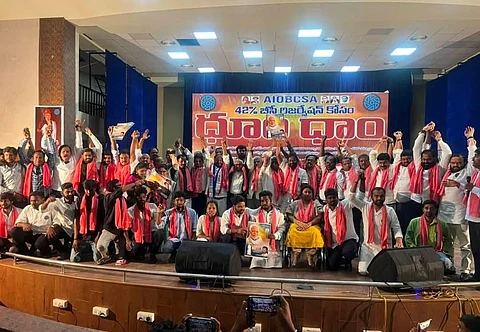

Follow TNM's WhatsApp channel for news updates and story links.
The All India OBC Students Association (AIOBCSA) has demanded that the Union government include Telangana’s 42% BC reservation laws in the Ninth Schedule of the Constitution, which would shield them from any judicial interventions.
At the BC Dhoom Dhaam event held at Osmania University in Hyderabad on Saturday, July 19, AIOBCSA president G Kiran Kumar and other BC leaders demanded that the 42% reservation for Backward Classes (BC) promised by the Telangana government in education, employment, and local bodies must be implemented without fail.
The Telangana Assembly had passed two important Bills in March this year to enhance BC reservations in education, government employment, and local governance to 42%, following the caste survey or the Social Education Employment Economic Political Caste (SEEEPC) Survey carried out towards the end of 2024.
The Congress-led state government sent the Bills to the Union government for presidential assent, which is still pending.
Speaking at the Dhoom Dhaam event, political theorist and activist Professor Kancha Ilaiah questioned the relevance of having a BC leader such as Narendra Modi as Prime Minister if such crucial matters remain unresolved. “The 42% reservation laws, if successful in Telangana, will be a model for the entire nation. But despite having a BC Prime Minister, the Union government isn’t declaring that they’re ready to remove the Supreme Court’s 50% cap on reservation,” he said.
The Indra Sawhney vs Union of India (1992) verdict, which laid down crucial guidelines for reservation policies, set a 50% upper limit on reservation for SCs, STs, and OBCs in jobs and education, the only exception being in case of extraordinary circumstances when supported by thorough data.
However, the Tamil Nadu Backward Classes, Scheduled Castes and Scheduled Tribes (Reservation of Seats in Educational Institutions and of appointments or posts in the Services under the State) Act, 1993 is able to provide 69% reservation for SC, ST, Most Backward Classes (MBCs), and Other Backward Classes (OBCs), as it is included in the Ninth Schedule of the Constitution.
Article 31B of the Constitution states that none of the Acts that are included under the Ninth Schedule nor any of the provisions “shall be deemed to be void, or ever to have become void,” and the Acts and provisions, “notwithstanding any judgment, decree or order of any court or tribunal to the contrary,” shall continue to be in force.
Kiran Kumar pointed out that the Bihar government’s legislation to increase reservations for EBC, OBC, SC, and ST communities from 50% to 65% based on a survey was struck down by courts because of the 50% reservation ceiling.
“The ball is in the Union government’s court. We have the example of Tamil Nadu. The Union government must include the Telangana Bills in the Ninth Schedule, or amend Articles 15 and 16 of the Constitution as it was done to implement reservation for Economically Weaker Sections (EWS),” Kiran Kumar said.
BC leaders at the event also questioned Union Minister Bandi Sanjay and other BC MPs’ silence on this issue. In the Assembly, however, the Bills had received unanimous support from all political parties, including the Bharat Rashtra Samithi (BRS), Bharatiya Janata Party (BJP), All India Majlis-e-Ittehad-ul-Muslimeen (AIMIM), and the Communist Party of India (CPI).
Many prominent BC leaders, including Telangana Mineral Development Corporation Chairperson Anil Eravathri, former Director General of Police Jujjavarapu Poornachandra Rao, retired IAS officer T Chiranjeevulu, Professor Kancha Illaiah, former Minister and BRS leader V Srinivas Goud, writer and activist Pasham Yadagiri, BC Welfare Association president Jajula Srinivas Goud, and National BC Dal President Dundra Kumaraswamy addressed the gathering.
The speakers expressed concern over the lack of response even three months after the Telangana BC reservation Bills were passed and sent to the Union government. They urged both the Union and state governments to focus on implementing the 42% reservation for BCs.
After the Telangana High Court had in June directed the state government to conduct local body elections in three months after finalising the reservations by the end of July, the state Cabinet decided to issue an ordinance to raise BC reservation in local bodies to 42%.
Minister Ponguleti Srinivasa Reddy has said that though the state government took up the issue of the pending Bills several times, the Union government kept delaying the matter. He said that the ordinance was decided on after consulting with the Advocate General to avoid any legal complications in the future.